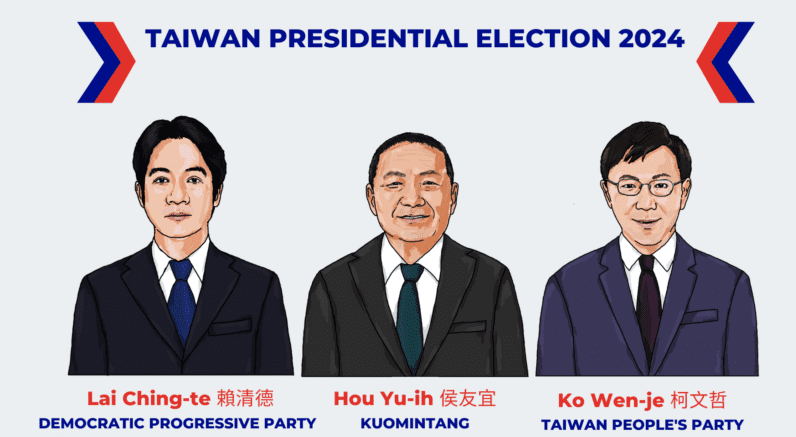
- China has intensified its efforts to influence the election in Taiwan and its influence operations extend beyond disinformation campaigns.
- Trade and business links are leveraged to sway Taiwanese businesses operating in China, showcasing the multifaceted strategies employed to influence the election outcome.
- Opinions on how to respond to China’s influence vary widely. While the DPP stresses being defiant and deepening alliances with the West, the KMT advocates for non-provocation and communication with Beijing to build trust.
As the world gears up for a year filled with elections, one of the earliest and most closely watched contests is unfolding in Taiwan. The January 13 election is turning out to be a nail-biter, with significant implications for global powers, especially the United States and China.
Initially, expectations leaned towards an easy victory for the ruling pro-independence Democratic Progressive Party (DPP). However, the final stages of the presidential and legislative race have proven to be anything but predictable. The DPP’s leader, William Lai, is facing a formidable challenge from the Beijing-friendly Kuomintang (KMT) candidate, Hou Yu-ih.
China, under President Xi Jinping’s Communist Party, has intensified its efforts to influence the election. Engaging in disinformation campaigns and spreading hoaxes on social media, China aims to swing the election in favour of a party more aligned with its interests. The latest polls reflect a tight race, with Lai holding a slim lead over Hou.
Against the backdrop of escalating tensions in the Taiwan Strait, where Chinese manoeuvres are met with a U.S.-backed boost to Taiwan’s defences, the stakes are exceptionally high. The recent approval of $300 million in defence spending by the U.S. has further heightened security concerns.
Lai’s opponents are seizing on the security implications, accusing him of pushing the island towards conflict due to his pro-independence stance. China has consistently warned that independence “means war,” emphasizing its willingness to use “all necessary measures” for unification.
The potential for open war over Taiwan is not just a regional concern but a global one. Taiwan plays a critical role in microchip supplies, and any conflict could have severe repercussions for the global economy.
The spectre of a DPP defeat has added intensity to the final weeks of the campaign. Vincent Chao, a DPP city councillor, acknowledges that the party finds itself in a head-to-head race, emphasizing the unpredictability of democracy after eight years in power.
Relations with China
China’s influence extends beyond disinformation campaigns. Trade and business links are leveraged to sway Taiwanese businesses operating in China, showcasing the multifaceted strategies employed to influence the election outcome.
Opinions on how to respond to China’s influence vary widely. While the DPP stresses the importance of retaining a defiant stance and deepening strategic alliances with the West, the KMT advocates for deterrence without provocation and communication with Beijing to build trust.
The cast of candidates, including Lai and Hou, adds a dynamic element to the race. Both sides have chosen leaders with humble roots to connect with voters, recognizing the prevailing cynicism towards political elites.
As the guessing game continues on the likelihood of Chinese intervention, the race remains tense. The KMT’s Alexander Huang believes a full-scale invasion is unlikely in the immediate future, provided policies are right. However, the uncertainty lingers, especially in a region where geopolitics can change rapidly.
The Taiwan election serves as a delicate balancing act, not only for the island’s future but for the broader geopolitical landscape. The outcome will impact not just the people of Taiwan but also the strategic interests of major global players.
(Aayush is a post-graduate student in International Relations at Kalinga University, Raipur. Views and opinions expressed are the author’s own)
Aayush Pal is a freelance writer on contemporary geopolitical developments. The views expressed in his work are entirely his own.
